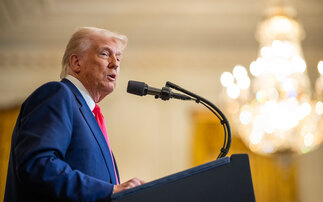No one was expecting a green economy bonanza, but Philip Hammond failed to meet even modest environmental expectations
You would think environmentalists had got used to being disappointed by Chancellors of the Exchequer, and yet you can tell by the reaction that each Spring the sting of Treasury rejection smarts once more.
Philip Hammond's first budget will lead to particular disillusionment amongst green business leaders, arguably even more so than those years when George Osborne would combine welcome support for renewables with snide comments about the cost of decarbonisation and transparent attempts to make support for fracking a political virility test.
Hammond has a good track record of supporting climate action and clean technology from his time at the Foreign Office, and today's address comes at a time when the stars have been edging towards alignment for the green economy. The Industrial Strategy promised support for decarbonisation, the interlocking Emissions Reduction Plan, 25 Year Plan for Nature, and Air Quality Plan are all imminent, clean tech costs are falling fast, public support for the low carbon transition has never been higher, and the government desperately needs the kind of post-Brexit growth and productivity boost the green economy can deliver. Moreover, the scuttlebutt within Whitehall is that relations between Treasury and BEIS are far better than they ever were between DECC and Number 11.
The frustrating delays to the Emissions Reduction Plan and 25 Year Plan for Nature meant a comprehensive green budget was always unlikely, but there were good political and economic reasons to hope for a speech that offered some succour to this most important of sectors.
Instead Hammond delivered a budget that made no mention of climate change, clean tech, renewable energy, or the environment as a whole. Moreover, there was no indication on what will happen to the Green Investment Bank, no relief for companies facing a tax hike for having the temerity to install solar panels, and no serious steps to tackle the air pollution crisis. In contrast, there was the promise of yet more tax breaks for North Sea oil and gas companies - further evidence the government wants to squeeze the sea bed dry of fossil fuels.
Worse still, there was a deferral of crucial decisions on what to do about the tax rate for diesel vehicles, what will happen to the UK's carbon pricing regime beyond 2021, and how clean power projects will be supported during the next decade.
Through no doubt gritted teeth the renewables industry responded with a pledge to eagerly work with the government on the promised replacement for the Levy Control Framework (LCF) that governs how clean power projects are supported. But as numerous experts have warned, there are prospective projects being put on hold now because developers have no clarity about what the policy landscape will look like when they start breaking ground. The four years to 2021 is the blink of an eye, the turn of a turbine, in energy project development terms. Each delay to these crucial decisions only serves to do more harm to the UK's energy security and decarbonisation efforts.
In fairness, it was not all bad news for the green economy.
The extra funding for electric and autonomous vehicles was welcome and provides further evidence that the government is keen to establish the UK as a green car hub. Similarly, the £690m fund to help councils tackle urban congestion could be used to address the air pollution crisis and the £300m earmarked for easing the impact of business rates changes could yet be applied to help those unfairly hit by renewable energy-related tax hikes.
The shake-up of technical education and promise of more support for re-training schemes could also play a major role in aiding the low carbon transition and tackling the skills crunch already being faced by many clean tech firms. The government's grammar school revival may be mired in a mixture of nostalgia and political opportunism, but when it comes to the perennial problem of the UK's technical skills base Hammond is making the right noises.
It is also important to note there are reasons to remain hopeful that 2017's second budget could deliver the ambitious and comprehensive green economic plan so sorely lacking from today's effort. Hammond could yet unleash his inner eco-warrior.
By the autumn the government should have come forward with its Emissions Reduction Plan, 25 Year Plan for Nature, and Air Quality Plan. The promise of new controls on how clean power projects are supported, Ofgem's review of smart technologies, and the Industrial Strategy's promise to review the cost of power sector decarbonisation brings with it the risk of a renewed media assault on 'green levies'. But it also raises the prospect of the government correcting the current flaws in the energy policy landscape and providing a cheaper way of mobilising investment in increasingly cost-effective clean power technologies through the 2020s, including onshore wind farms, solar arrays, next generation nuclear, and energy storage and smart grid systems.
Similarly, the review of diesel tax rates means the door is not shut on proposals for a diesel scrappage scheme, just as hopes remain that the Emissions Reduction Plan will be backed by a renewed push to improve building energy efficiency, curb transport emissions, and accelerate the roll out of green heat technologies.
All is still to play for and a critical six months now awaits the UK's green economy. And yet, the nagging question remains is how, nearly 18 months on from the Paris Agreement and after years of warnings from mainstream business leaders about the need for low carbon policy stability, can the Treasury be so insouciant in its deferral of crucial decisions and apparently indifferent towards the needs of such a crucial part of the economy?
There are obvious long-standing structural reasons that have led successive Chancellors to underplay environmental risks and regard the oil and gas industry as the goose that lays the golden egg, even as its long-term outlook grows ever more stormy.
But for this budget, the cause of the latest delay lies with Brexit. Despite the government's protestations to the contrary, Brexit is consuming civil service bandwidth at a voracious rate. One of the little-discussed components of the historic project to leave the EU is the huge opportunity cost it imposes on the UK's political and business community. Were it not for Brexit the Emissions Reduction Plan and 25 Year Plan for Nature would be done and dusted by now and Hammond would have been obliged to deliver a budget that supported their vision.
Brexit's ability to dominate the domestic political scene to the expense of other crucial concerns, such as the long-term health of the economy and environment, could be offset by an effective opposition that scared the government into action. But instead we have Jeremy Corbyn and his increasingly subterranean approval ratings. Corbyn rightly accused Hammond of "complacency" in his budget response. What he did not say was that it is hard for a politician not to be complacent when his party has a 15-point poll lead.
It might seem unfair to blame Corbyn for the government's failings, but politics is a brutally unfair business and the fact remains that if there was a credible government-in-waiting on the opposition benches landing blows on the government on a weekly basis then Ministers would find it much harder to simply gloss over potentially vote-winning measures to expand the green economy.
Instead, the opposition that is likely to cause Hammond and his boss in Number 10 the most sleepless nights comes from the Conservative Hard Right and the Daily Mail. Labour's implosion leaves a vacuum in the political landscape that means some Ministers regard the greater political risk arising from climate action comes from them embracing high rather than low levels of ambition. Hence the willingness to excise any mention of climate action from the Treasury's annual set piece and defer green decisions that could be spun by the UK's small but vocal group of climate sceptics as costly interventions.
That, ultimately, is why this budget feels so disappointing. It not only heralds further delays to decisions that would be both popular and in the UK's long term economic and environmental interests. It threatens yet another round of political trench warfare simply to get the government to recognise that honouring its Paris Agreement commitments should be a priority that is in the interests of businesses, the Conservative Party, and all of our lungs.








